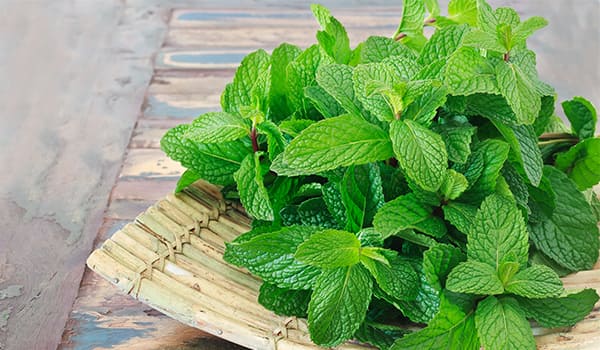Zingy, fortifying and refreshing, one of the oldest culinary herb, mint can set almost everything right. Mint or mentha is not only tasty and used for culinary purposes but is also loaded with medicinal properties and health benefits. From enhancing mocktails and teas, to managing blood sugar levels and treating skin conditions, one must not undermine the power of the herb.
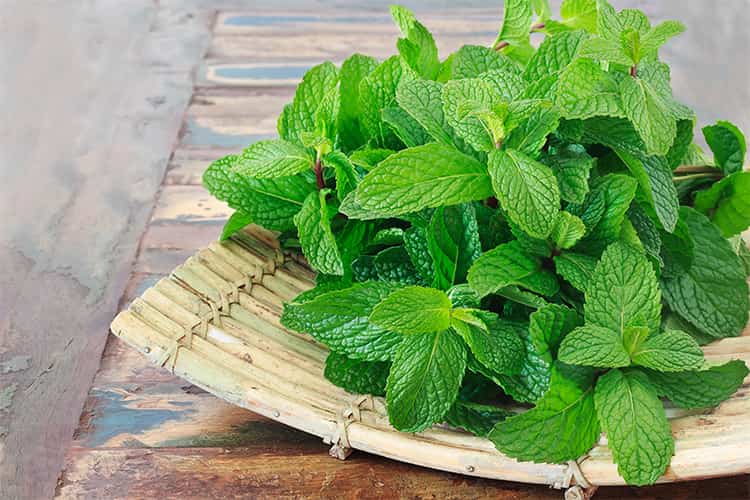
In this article we bring to you all the health benefits of mint leaves, its side effects, mint leaves benefits for weight loss, the nutrition content of mint, how to use mint in our diet, Uses of mint leaves, and so on. Do give it a read and reap the benefits that the herb has to offer.
What Is The Nutritional Value Of Mint Leaves:
Wondering what vitamins are in mint leaves? Well, while typically consumed in small quantities, even half and ounce of mint leaves or it’s family consumed in a day can be highly nutritious.
Vitamins:
Mint is a great source of vitamin A, a fat-soluble vitamin, as well as other vitamins in minute quantities including vitamin c and B-complex vitamins.
1/4-cup serving of spearmint provides 31% of the daily intake of vitamin A for men and 40% for women.
Minerals:
Spearmint in particular serves as a good source of minerals, including iron and manganese.
A serving of spearmint contains 2.7 milligrams of iron, amounting to 15% of required iron content in women and 34% in men.
The manganese content in spearmint amounts to 11 percent of the daily requirement for men and 14 percent for women.
Mint is also a potent source of antioxidants, in comparison to other herbs.
Breaking the nutritional value further, 1/3 cup of spearmint contains:
- Calories: 6
- Fiber: 1 gram
- Vitamin A: 12% of the RDI
- Iron: 9% of the RDI
- Manganese: 8% of the RDI
- Folate: 4% of the RDI
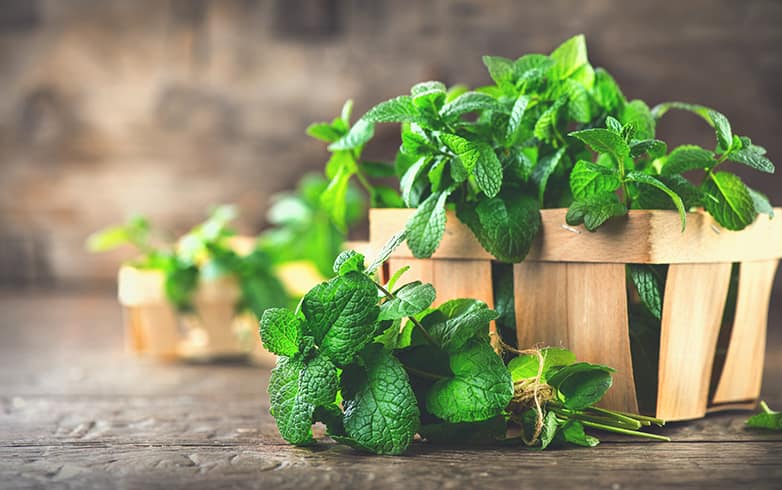
Mint Leaves Uses:
Mint leaves uses are numerous. The aromatic and flavorful mint leaves are used in a lot of dishes including salads, juices, smoothies, yogurt, mocktails among other dishes. The strong flavor of mint leaves makes for a great ingredient instead of artificial flavors, sugars and sodium.
Read on to know how to use mint in your daily diet and routine.
1. Adding mint to Greek yogurt is the best way to consume the herb.
2. Mint tea for health is essential as it aids in digestion. Depending on your taste add 5-6 mint leaves in boiling tea water and leave it for a few minutes for a peppermint tea. You can consume the leaves while sipping on tea.
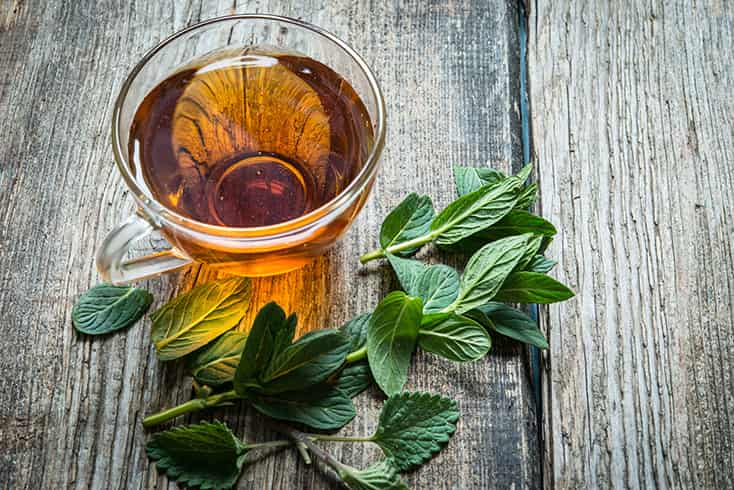
3. Nothing can beat the taste of a minty lime fizzler on a warm summer day.
7. Mint works great in curing cold and providing relief from stuffy nose.
8. Inhaling peppermint essential oil has been proved to improve brain function.
9. If you are wondering how is mint used for face, well, since mint leaves contain salicylic acid, it helps treat acne and pimples to some extent.
Mint Leaves Benefits for Weight Loss:
Can mint leaves make you lose weight, one of the most frequently asked questions on the web and in the doctor’s room. Well, yes, mint leaves or pudina helps lose weight to an extent owing to some amazing qualities present in it.
Mint leaves burn calories:
There is a small amount of catechins and caffeine present in pudina aka mint leaves that stimulate the digestive enzymes, thereby boosting the metabolism. As a result the body burns extra calories than it normally does.
Improves Digestion leading to weight loss:
The active compound menthol present in mint leaves helps in smooth digestion. Elimination of waste from the body thereby results in weight loss.
Hunger Suppression:
Fresh smelling mint leaves is said to highly impact your appetite, by suppressing your cravings. Next time you crave to gorge on junk food, chew on a few mint leaves instead.
Stress Buster:
It is no surprise to us that stress is one of the leading causes of weight gain. According to studies, mint leaves fragrance has a soothing effect on the nervous system thereby reducing stress, leading to weight loss.
Health Benefits Of Mint Leaves:
Mint is said to have a large number of health benefits. The active oil present in mint called menthol, is loaded with antiseptic and antibacterial properties. Let’s take a look at the numerous health benefits of mint.
1. Soothes an upset stomach:
Mint is a great relief for any digestion problems including an upset tummy. The herb is said to speed up and ease the digestion process by increasing the bile secretions and also improving the bile flow. Peppermint oil when taken with meals proves as a great relief from gas and indigestion.
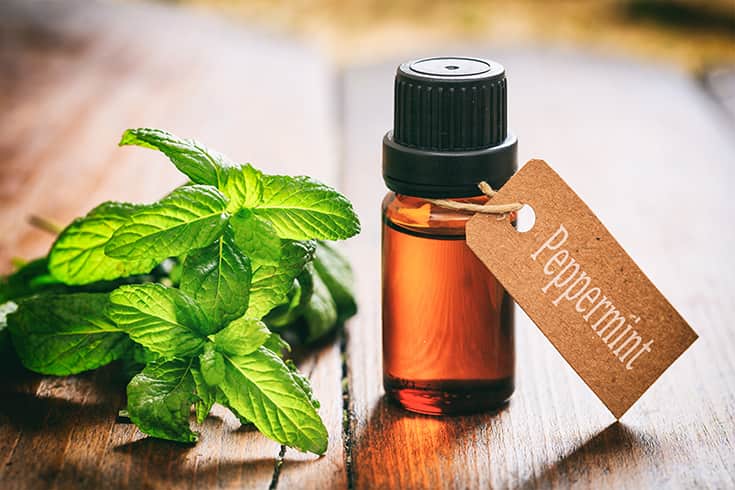
2. Improves Brain Function:
Researches show that inhaling the aroma of peppermint essential oil improves the brain function, including memory and alertness, and decreases anxiety, fatigue and frustration.
However, more research and investigation is required to understand and prove the effectiveness of the essential oil on brain function.
3. Reduces Breastfeeding Pain:
Mothers who breastfeed their children often experience sore nipples, making breastfeeding difficult. Health experts say that applying mint in the form of essential oil to the sore and cracked nipples helps soothe the area and relieves pain.
4. Allergies:
Mint plant contain rosmarinic acid which is an anti-inflammatory and antioxidant agent that has proven to relieve seasonal allergy symptoms.
5. Beats depression and stress:
Mint is the most important part of aromatherapy as its refreshingly strong smell rejuvenates the mind. The adaptogenic properties present in the herb keeps the cortisol level in control, balances the body in whatever way is needed and increases the the body’s natural resilience to stress. Further, studies say that breathing in the minty aroma helps release small amounts of serotonin in the brain that may help beat depression.
6. Oral Health:
Mint contains anti-microbal properties that help maintain proper oral hygiene. Eating fresh or dried mint leaves instantly freshens the mouth and is an effective remedy for bad breath. The germicidal properties in mint prevents bacterial growth inside the mouth as well as removes plaque deposition on teeth. This is the reason why most toothpastes are infused with mint oil.
7. Skin Care:
We’ve mentioned this earlier as well, that mint is an effective remedy to treat pimples and acne, reason being the high content of salicylic acid present in the herb. Also, since mint contains high amounts of antioxidants, it helps in new skin cell formation by fighting against free radicals. The best way to use it is to mix the crushed mint leaves with a teaspoon of honey and leave it on the face for 20 mins before washing it off.
[sc:mediad]
8. Treats Asthma:
Studies show that when asthmatic patients consumed mint, to an extent it gave them a relief from difficulty in breathing. The anti-inflammatory properties present in mint servers as a relaxant from congestion. However, consume in moderate amounts to prevent irritation of the air passage.
9. Irritable bowel syndrome (IBS):
Peppermint oil is said to be a good treatment for people suffering from discomfort due to irritable bowel syndrome because of the compound menthol present in it. However, it is advised to take peppermint oil capsules rather than chewing raw mint.
10. Ease nausea and morning sickness symptoms:
Smelling a few leaves and even eating them first thing in the morning is said to have positively relieved pregnant women from morning sickness and cope better.
So, these were some of the incredible health benefits of mint or pudina that you must know.
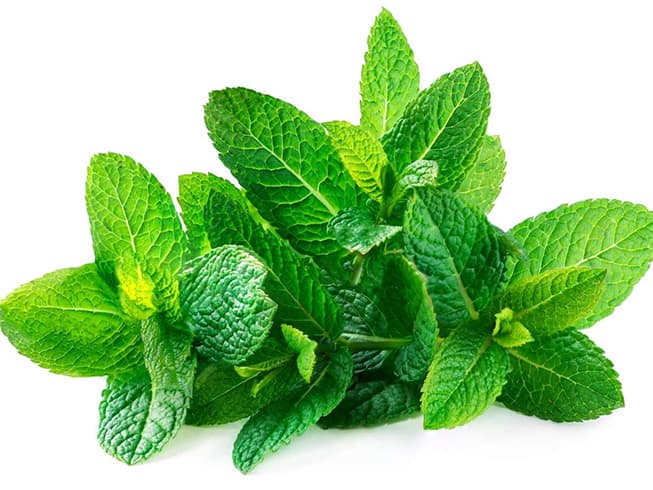
Source: medicalnewstoday.com
What are the side effects of mint leaves?
Mint, just like any other herb do have its share of side effects. Some of the adverse effects related to mint are:
1. If you suffer from gastroesophageal reflux disease (GERD), avoid mint to soothe its symptoms, as mint can worsen the problem and cause more harm than good.
2. Anything taken in excess is bad and so is peppermint oil. Large doses of peppermint oil can be toxic. Also, remember never to consume pure menthol as it is poisonous and can lead to death.
3. Never use mint oil on an infant or small child’s face as the menthol present in it can inhibit breathing by causing spasms.
4. Mint products should be avoided at large if you are suffering or have suffered from gallstones in the past.
And most importantly, have a word with your doctor to find out if mint oil could interact with any of your medications.
Mint is not very difficult to grow and can be planted in small pots. However, the herbs require ample sunlight. What’s even better is that mint growing in your garden help effectively ward off ants and flies. While buying mint, be sure to check for unblemished, bright leaves. When stored in the refrigerate, mint leaves can be used at least for a week.
This summer, be sure to stock up your dose of mint for a cool, refreshing feel.
Disclaimer:
All content mentioned in the article is created purely for informational purposes only. It is not a replacement for any kind of professional medical advice. Please seek your doctor’s guidance regarding your health or a medical condition.
